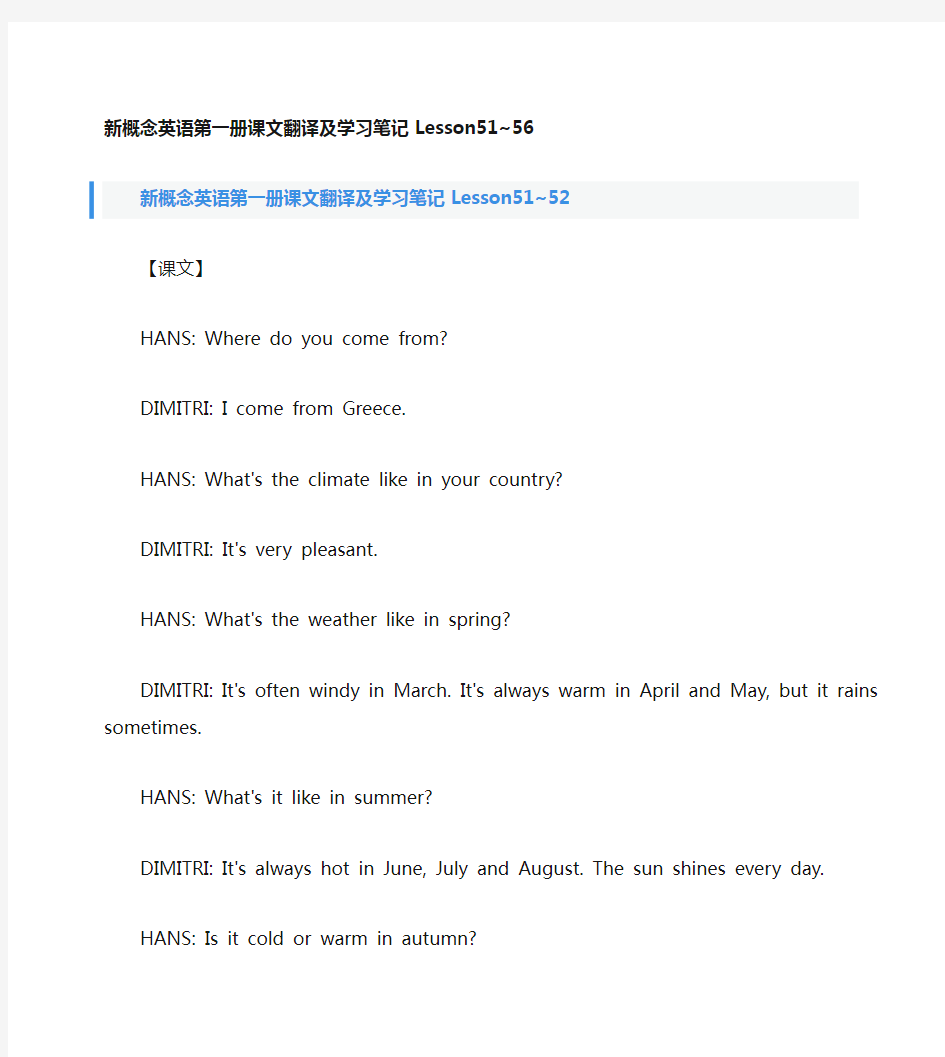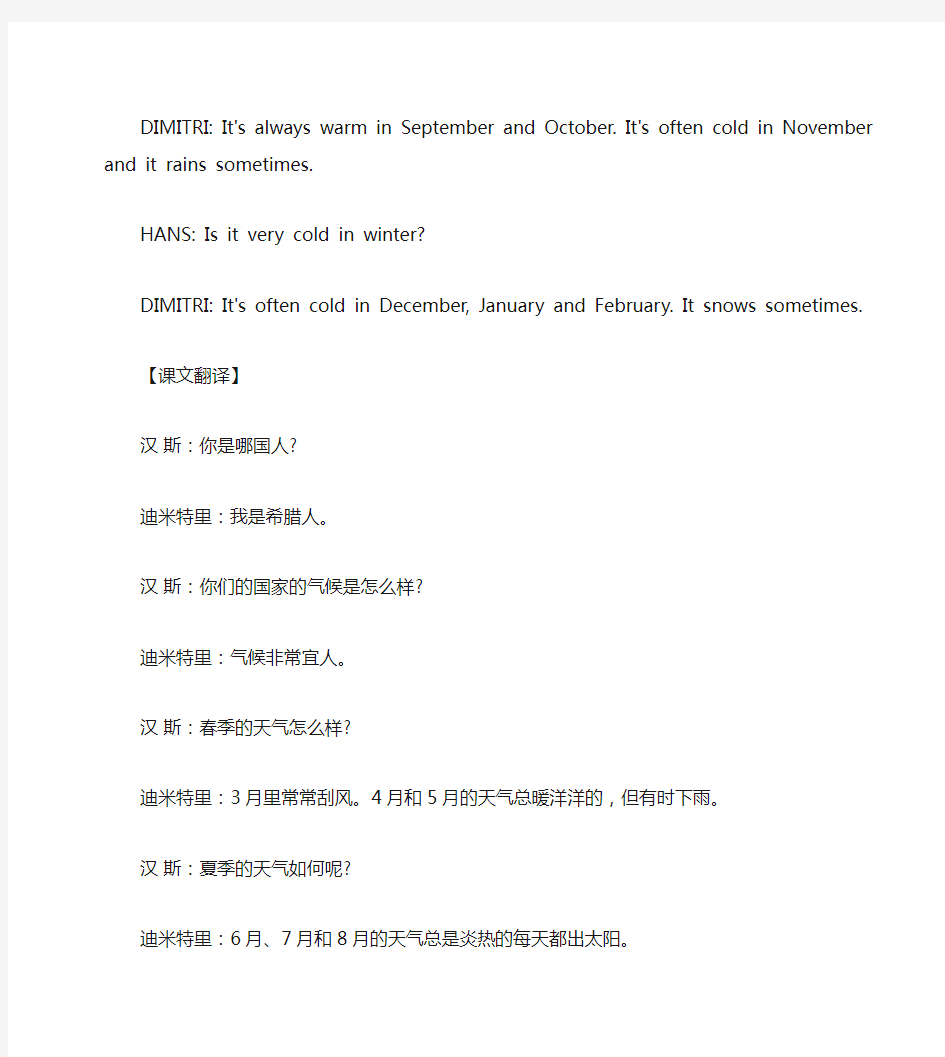

新概念英语第一册课文翻译及学习笔记Lesson51~56 新概念英语第一册课文翻译及学习笔记Lesson51~52
【课文】
HANS: Where do you come from?
DIMITRI: I come from Greece.
HANS: What's the climate like in your country?
DIMITRI: It's very pleasant.
HANS: What's the weather like in spring?
DIMITRI: It's often windy in March. It's always warm in April and May, but it rains sometimes.
HANS: What's it like in summer?
DIMITRI: It's always hot in June, July and August. The sun shines every day.
HANS: Is it cold or warm in autumn?
DIMITRI: It's always warm in September and October. It's often cold in November and it rains sometimes.
HANS: Is it very cold in winter?
DIMITRI: It's often cold in December, January and February. It snows sometimes.
【课文翻译】
汉斯:你是哪国人?
迪米特里:我是希腊人。
汉斯:你们的国家的气候是怎么样?
迪米特里:气候非常宜人。
汉斯:春季的天气怎么样?
迪米特里:3月里常常刮风。4月和5月的天气总暖洋洋的,但有时下雨。
汉斯:夏季的天气如何呢?
迪米特里:6月、7月和8月的天气总是炎热的每天都出太阳。
汉斯:秋季的天气是冷还是暖呢?
迪米特里:9月和10月总是很暖和,11月常常就冷了,而且有时下雨。汉斯:冬季的天气很冷吗?
迪米特里:12月、1月和2月常常很冷,有时还下雪。
【生词】
Greece n. 希腊
climate n. 气候
country n. 国家
pleasant adj. 宜人的
weather n. 天气spring n. 春季windy adj. 有风的warm adj. 温暖的rain v. 下雨sometimes adv. 有时summer n. 夏天autumn n. 秋天winter n. 冬天snow v. 下雪January n. 1月February n. 2月
March n. 3月April n. 4月
May n. 5月
June n. 6月
July n. 7月August n. 8月September n. 9月October n. 10月November n. 11月December n. 12月【知识点讲解】
1. 这节课的生词比较多,不过明天就是周末了,大家花两天时间好好记忆一下吧!这节课的单词中我们学到了四季和12个月份的表达方式,是很重要的词汇哦!
2. Where do you come from? 意思是“你从哪儿来?”“你是哪儿人?” 也可以说成“Where are you from?” 意思一样。
3. What's the climate like in your country? 你们国家的气候怎么样? 这里的like用作是介词,不是动词,它的宾语是what,意思类似“像……”而不是用作动词时所表达的“喜欢”的含义。
4. always, often, sometimes 这三个词都是表示频率。其中always最频繁、often其次,sometimes只表示有时候。
新概念英语第一册课文翻译及学习笔记Lesson53~54
【课文】
HANS: Where do you come from?
JIM: I come from England.
HANS: What's the climate like in your country?
JIM: It's mild, but it's not always pleasant.
The weather's often cold in the North and windy in the East.
It's often wet in the West and sometimes warm in the south.
HANS: Which seasons do you like best?
JIM: I like spring and summer. The days are long and the nights are short. The sun rises early and sets late.
I don't like autumn and winter. The days are short and the nights are long. The sun rises late and sets early.
Our climate is not very good, but it's certainly interesting.
It's our favourite subject of conversation.
【课文翻译】
汉斯:你是哪国人?
吉姆:我是英国人。
汉斯:你们国家的气候怎么样?
吉姆:气候温和,但也不总是宜人的。
吉姆:北部的天气常常寒冷,东部则常常利风。
西部常下雨,南部有时则很暖和。
汉斯:你最喜欢哪些季节?
吉姆:我最喜欢春季和夏季。
因为此时白天长而夜晚短,太阳升得早而落得晚。我不喜欢秋天和冬天。
因为那时白天短、夜晚长,太阳升得晚、落得早
虽然我们国家的气候并不很好,但又确实很有意思。天气是我们最喜欢谈论的话题。
【生词】
mild adj. 温和的,温暖的always adv. 总是
north n. 北方
east n. 东方
wet adj. 潮湿的
west n. 西方
south n. 南方
season n. 季节
best adv. 最
night n. 夜晚
rise v. 升起
early adv. 早
set v. (太阳)落下去
late adv. 晚,迟
interesting adj. 有趣的,有意思的
subject n. 话题
conversation n. 谈话
【知识点讲解】
1. 今天的单词依旧比较多,大家要加油咯!东南西北的表达是一组,联合起来记比较容易。另外“在北方”这样的表达是:in the north, 介词用in.
2. mild这个单词除了可以用以形容气候温和,也可以形容人的脾气好。
3. 今天额外再出一道题,考察一下大家对助动词的掌握,下次公布答案。我们都知道“你从哪里来?”应该说Where do you come from? 那么“他/她从哪里来?” 这句话要怎么翻译呢?
新概念英语第一册课文翻译及学习笔记Lesson55~56
【课文】
The Sawyers live at 87 King Street.
In the morning, Mr. Sawyer goes to work and the children go to school. Their father takes them to school everyday.
Mrs. Sawyer stays at home every day. She does the housework.
She always eats her lunch at noon.
In the afternoon, she usually sees her friends. They often drink tea together.
In the evening, the children come home from school. They arrive home early.
Mr. Sawyer comes home from work. He arrives home late.
At night, the children always do their homework. Then they go to bed.
Mr. Sawyer usually reads his newspaper, but sometimes he and his wife watch television.
【课文翻译】
索耶一家住在国王街87号。
早上,索耶先生去上班,孩子们去上学。父亲每天送孩子们去上学。
索耶夫人每天呆在家里。她料理家务。
她总是在正午吃午饭。
下午,她总是会见她的朋友。她们经常在一起喝茶。
傍晚,孩子们放学回家。他们到家很早。
索耶先生下班回家。他到家很晚。
晚上,孩子们总是做作业,然后去睡觉。索耶先生总是读报纸,但有时和他的妻子一起看电视。
【生词】
live v. 住,生活stay v. 呆在,停留home n. 家;adv. 到家housework n. 家务lunch n. 午饭afternoon n. 下午usually adv. 通常together adv. 一起evening n. 晚上arrive v. 到达
night n. 夜间
【知识点讲解】
1. the saywers 意思是指“索亚一家人”。在英语中把姓氏加上复数,再在前面加the就能表示这一家人的意思。比如The Youngs,就代表“杨家”。
2. 表示大的时段的单词,比如morning, noon, afternoon和evening,前面的介词都用in。比如in the morning, in the afternoon... 只有表示夜晚那个单词night,要用at night.
3. go to school 意思是上学,在school前面不加the;come home或者是go home,这里都不用to和the.
4. They arrive home early. 这句话里的home和early都是副词,用来修饰和补充arrive 这个动词。